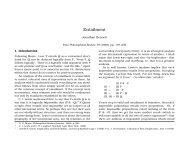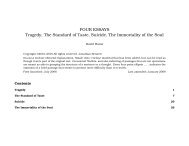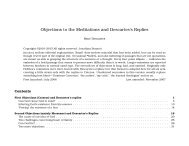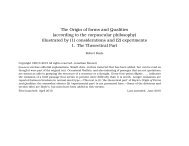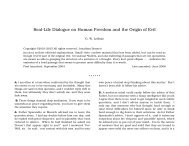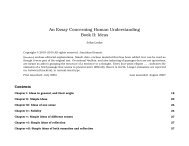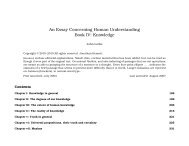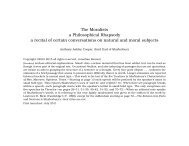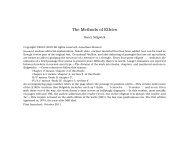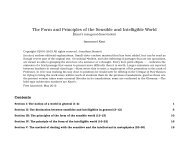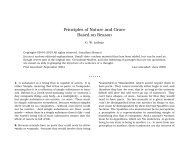A Vindication of the Rights of Woman with - Early Modern Texts
A Vindication of the Rights of Woman with - Early Modern Texts
A Vindication of the Rights of Woman with - Early Modern Texts
Create successful ePaper yourself
Turn your PDF publications into a flip-book with our unique Google optimized e-Paper software.
The <strong>Rights</strong> <strong>of</strong> <strong>Woman</strong> Mary Wollstonecraft 13: Harm done by women’s ignorance<br />
inferior. . . ., but I contend that <strong>the</strong> heart would expand as<br />
<strong>the</strong> understanding gained strength if women were not held<br />
down from <strong>the</strong>ir cradles.<br />
I know that a little sensibility and great weakness will<br />
produce a strong sexual attachment [= ‘a strong attachment to<br />
members <strong>of</strong> one’s own sex’], and that friendship is made stronger<br />
by reason; so more friendship is to be found in <strong>the</strong> male than<br />
<strong>the</strong> female world, and men have a higher sense <strong>of</strong> justice.<br />
The narrowly focussed affections <strong>of</strong> women seem to resemble<br />
Cato’s most unjust love for his country. He wished to crush<br />
Carthage, not to save Rome but to promote its vainglory. . . .<br />
Besides, how can women be just or generous when <strong>the</strong>y<br />
are <strong>the</strong> slaves <strong>of</strong> injustice?<br />
5: Ignorance about child-care<br />
As <strong>the</strong> rearing <strong>of</strong> children—i.e. <strong>the</strong> laying a foundation <strong>of</strong><br />
sound health both <strong>of</strong> body and mind in <strong>the</strong> rising generation—<br />
has justly been insisted on as <strong>the</strong> task especially assigned<br />
to women, <strong>the</strong>ir ignorance about it must be contrary to <strong>the</strong><br />
order <strong>of</strong> things. If <strong>the</strong>y are to become sensible mo<strong>the</strong>rs, I<br />
contend, <strong>the</strong>ir minds will have to take in much more than<br />
<strong>the</strong>y now do, and <strong>the</strong>y can do so. Many men attend to <strong>the</strong><br />
breeding <strong>of</strong> horses, and supervise <strong>the</strong> management <strong>of</strong> <strong>the</strong><br />
•stable, and yet would. . . .think <strong>the</strong>mselves degraded by paying<br />
any attention to <strong>the</strong> •nursery; yet ever so many children<br />
are absolutely murdered [MW’s phrase] by <strong>the</strong> ignorance <strong>of</strong><br />
women! And <strong>of</strong> those who escape that, and are not destroyed<br />
by unnatural negligence or blind fondness, very few are<br />
managed properly <strong>with</strong> respect to <strong>the</strong> infant mind. A child’s<br />
spirit is allowed to become vicious at home, so <strong>the</strong> child<br />
is sent to school to have his or her spirit broken; and <strong>the</strong><br />
methods <strong>the</strong> school uses—and must use to keep a number<br />
<strong>of</strong> children in order—scatter <strong>the</strong> seeds <strong>of</strong> almost every vice<br />
104<br />
in <strong>the</strong> soil that has been forcibly torn up.<br />
[MW compares this treatment <strong>of</strong> children <strong>with</strong> <strong>the</strong> forceful<br />
‘breaking’ <strong>of</strong> a horse. Perhaps <strong>the</strong> latter is not permanently<br />
injurious to <strong>the</strong> horse, she says, but:] I am certain that<br />
a child should never be thus forcibly tamed after it has<br />
unwisely been allowed to run wild; for every violation <strong>of</strong><br />
justice and reason in <strong>the</strong> treatment <strong>of</strong> children weakens<br />
<strong>the</strong>ir reason. They catch a character [MW’s phrase] so early—<br />
experience leads me to infer—that <strong>the</strong> base <strong>of</strong> <strong>the</strong> moral<br />
character is fixed before <strong>the</strong>ir seventh year, <strong>the</strong> period during<br />
which women are allowed <strong>the</strong> sole management <strong>of</strong> children.<br />
Afterwards it too <strong>of</strong>ten happens that half <strong>the</strong> business <strong>of</strong><br />
education is to try to correct <strong>the</strong> faults, that <strong>the</strong> children<br />
would never have acquired if <strong>the</strong>ir mo<strong>the</strong>rs had had more<br />
understanding.<br />
One striking instance <strong>of</strong> <strong>the</strong> folly <strong>of</strong> women must be mentioned,<br />
namely <strong>the</strong>ir treatment <strong>of</strong> servants in <strong>the</strong> presence<br />
<strong>of</strong> children, allowing <strong>the</strong> children to think that <strong>the</strong> servants<br />
ought to wait on <strong>the</strong>m and to put up <strong>with</strong> <strong>the</strong>ir moods.<br />
A child should always be made to receive assistance from<br />
a man or woman as a favour; and as <strong>the</strong> first lesson <strong>of</strong><br />
independence <strong>the</strong>y should learn from <strong>the</strong>ir mo<strong>the</strong>r’s example<br />
not to require personal attendance that it is an insult to<br />
humanity to require (unless one is ill). . . . I have <strong>of</strong>ten heard<br />
servants imperiously called to put children to bed, and sent<br />
away again and again because master or miss hung about<br />
mamma so as to stay up a little longer. . . .<br />
[MW concludes this subsection <strong>with</strong> reflections on how a<br />
woman could be a good mo<strong>the</strong>r while also engaging in o<strong>the</strong>r<br />
pursuits that would improve her intellect and her morals.]



